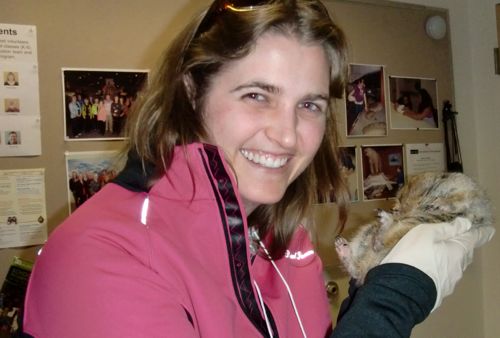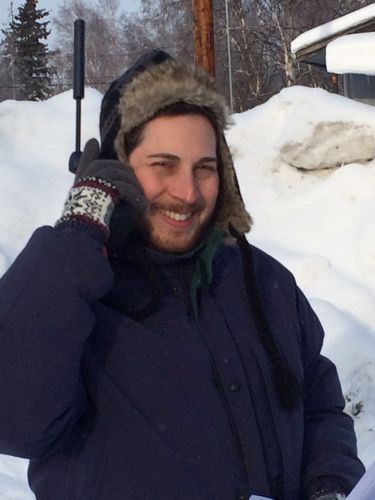 Ice Sculpture at Museum of the North
Ice Sculpture at Museum of the North
So what have we been doing up here during orientation? Well, just like orientation at school, we learn a lot about what our experience is going to be like, we learn new skills, cover the specifics of how we are going to be doing things related to our role as teachers, we go on field trips, and we even have homework!
Learning about the upcoming field experiences
 PolarTREC teachers Dominique Richardson, Peggy McNeal, and Susan Steiner analyzing a sediment core.
PolarTREC teachers Dominique Richardson, Peggy McNeal, and Susan Steiner analyzing a sediment core.
We have researchers joining us who have presented on their specific research and hear about their work with PolarTREC teachers in the past. There have been presentations from Steve Okkonen about some of his oceanographic studies in the arctic, Heidi Roop about her paleogeology research in Antarctica, Jeanette Moore about her research with arctic ground squirrels, and Julie Brigham-Grette about high arctic change research. It's all been very interesting, and makes you wish you were able to partake in of all of the diverse research other teachers are participating in this year (I will definitely be following their expedition journals, and you should too)!
 Lauren Watel holding a hibernating arctic ground squirrel
Lauren Watel holding a hibernating arctic ground squirrel
We have heard from several PolarTREC alumni teachers about their different experiences, what worked, and didn't work for them so that we have a better idea of what to expect from this process. They have been incredible resources for not only getting us more excited, but also to help ease concerns and provide tips about things we never even though about.
Learning new skills
We have to practice, practice, practice lots of different skills. We have learned about how to write and post these journal entries, and have been learning about how to insert pictures, as well as edit them, and create and edit videos. There are lots of variables and possibilities so we get a chance to play and practice to get better and more comfortable.
 Armando Coussade practicing communications on a satphone.
Armando Coussade practicing communications on a satphone.
We also have learned how to make a call on a satphone. Many of the places we are going are very remote. Though with modern technology everyone will be able to have a phone to call home, call out for emergencies, and update our blogs. Some journals may even be a voice recording if connecting to the internet and sending data is too difficult!
Logistics
We have heard from our logistics support personnel. Since I'm heading to the arctic I will be working with CH2M Hill Polar Services to make sure I have the correct gear as well as transportation to my site.
We also went to CH2M Hill to try on some of the gear we will be issued. Since we are all going very different places there is a lot of variety in the type of apparel we will be issued. Note the gear below is not at all representative of what I will need at Toolik! My gear will be much more focused on separating myself from the mosquitos versus the extreme cold!
 Lauren Watel trying out Antarctic gear.
Lauren Watel trying out Antarctic gear.
Field trips
We have taken a couple of field trips, these have been the most fun part. We went to the Museum of the North at the University of Alaska and viewed the exhibits to learn more about the biological, cultural and geologic history of Alaska.
 Lauren Watel and a massive Kodiac grizzley
Lauren Watel and a massive Kodiac grizzley
Finally we will spend some time at the United States Army Cold Regions Research and Engineering Laboratory (CRREL) and be going in a permafrost tunnel. We will also visit the Alaska Pipeline on that outing as well.
As you can see we've been very busy!


Comments